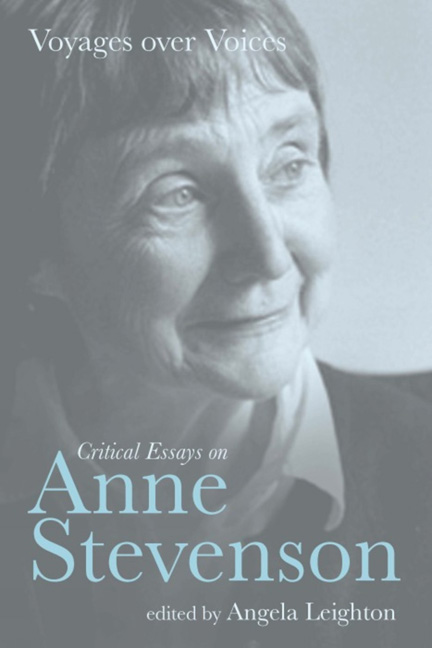Book contents
- Frontmatter
- Contents
- Notes on Contributors
- Acknowledgements
- ‘Making Poetry’
- 1 ‘Voyages over voices’: Introduction
- 2 The Melting Metaphor
- 3 ‘Between us’: Letters and Poems of Stevenson and Bishop
- 4 Mothers, Mirrors, Doubles: Anne Stevenson's Elegies for Sylvia Plath
- 5 Staging Second Thoughts: The Poetry of Anne Stevenson
- 6 ‘Making Poetry’: The Exemplary Anne Stevenson
- 7 ‘A curved adventure’: Romanticism and the Poetry of Anne Stevenson
- 8 The Nature of Anne Stevenson
- 9 Anne Stevenson and the Poetry of Place
- 10 Compacting Time: Anne Stevenson's Poems of Memory
- 11 ‘Not exactly a persona’: Pronouns in Anne Stevenson's Poetry
- 12 ‘To serve a girl on terrible terms’: Anne Stevenson's Writing Selves
- 13 Talking and Singing: Anne Stevenson's Variations on a Rhythmical Theme
- 14 ‘Time will erase’: Anne Stevenson and Elegy
- 15 Observing the Overhearing: The Anne Stevenson Papers in Cambridge University Library
- 16 Bibliography of Anne Stevenson's Published Works
- General Index
- Index of Stevenson's Works
15 - Observing the Overhearing: The Anne Stevenson Papers in Cambridge University Library
- Frontmatter
- Contents
- Notes on Contributors
- Acknowledgements
- ‘Making Poetry’
- 1 ‘Voyages over voices’: Introduction
- 2 The Melting Metaphor
- 3 ‘Between us’: Letters and Poems of Stevenson and Bishop
- 4 Mothers, Mirrors, Doubles: Anne Stevenson's Elegies for Sylvia Plath
- 5 Staging Second Thoughts: The Poetry of Anne Stevenson
- 6 ‘Making Poetry’: The Exemplary Anne Stevenson
- 7 ‘A curved adventure’: Romanticism and the Poetry of Anne Stevenson
- 8 The Nature of Anne Stevenson
- 9 Anne Stevenson and the Poetry of Place
- 10 Compacting Time: Anne Stevenson's Poems of Memory
- 11 ‘Not exactly a persona’: Pronouns in Anne Stevenson's Poetry
- 12 ‘To serve a girl on terrible terms’: Anne Stevenson's Writing Selves
- 13 Talking and Singing: Anne Stevenson's Variations on a Rhythmical Theme
- 14 ‘Time will erase’: Anne Stevenson and Elegy
- 15 Observing the Overhearing: The Anne Stevenson Papers in Cambridge University Library
- 16 Bibliography of Anne Stevenson's Published Works
- General Index
- Index of Stevenson's Works
Summary
‘The pathway up Parnassus is strewn with the litter of abandoned drafts’, Anne Stevenson wrote in an essay in which she analysed the composition of her sonnet ‘Moonrise’ and transcribed a series of its worksheets. Her metaphor is hardly flattering to archivists, casting them in the necessary but unglamorous role of litter-pickers, and perhaps even less so to academic researchers, who become analogous to the grubby sort of criminal who tears open refuse sacks in the hunt for personal details. But even in writing her essay, Stevenson acknowledged the legitimacy of interest in the processes by which her literary works have been created, and recognised the value of the documentary record of their generation and fashioning. The present volume is the first book-length consideration of Stevenson's work, but it seems unlikely that it will be the last, and insofar as future research into her writings will rely on examination of the papers accumulated in the course of their making – on the original manuscript and typescript drafts of the poems and prose, and on the records of the life out of which those works arose – it will largely depend on the Stevenson archive kept in Cambridge University Library as MS Add. 9451.
The Cambridge archive is not the only collection of Stevenson's papers in a publicly accessible repository, but it is by far the most important. Stevenson donated the first and largest tranche in August 1997, at the time of her move from a cottage in Grantchester, and since then she has made numerous supplementary gifts, ranging in size from several files to a single postcard. No arrangement of the collection can be considered final while material is still being received, but already the archive falls into several broad subdivisions: texts of verse and prose works in various genres; correspondence; subject files; publications and other printed matter; images and sound recordings; and papers of family members. This article is neither a hand-list to the archive nor a critical analysis of the work; it is intended rather as a guide to the Stevenson paper trail on Parnassus, one that points out salient features and interesting details in the hope that some readers may want to follow it themselves.
- Type
- Chapter
- Information
- Voyages over VoicesCritical Essays on Anne Stevenson, pp. 214 - 241Publisher: Liverpool University PressPrint publication year: 2010



